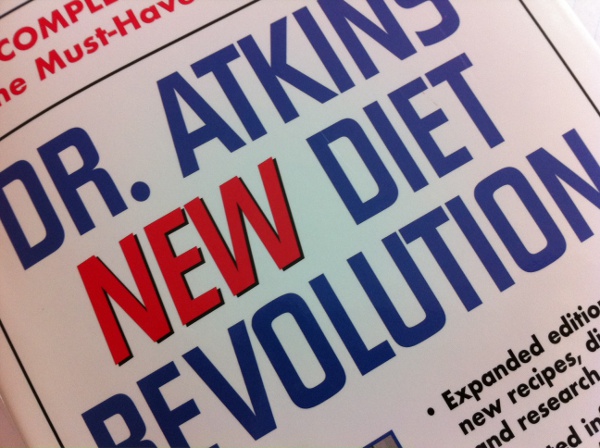Atkins’ Induction Diet – Introduction to the Diet
Today is day 1 of the 2 week challenges and the start of the Atkins induction diet. I did my research by reading the atkins’ diet website and Dr. Robert C. Atkins’ New Diet Revolution book. A large section of the book deals with the science behind the diet – from insulin to metabolic advantage. Then there’s a large chunk of the book that talks in detail about the diet and what you can and cannot eat. The induction diet is the first couple of weeks on the Atkins’ diet (the 1st of 4 phases of the diet). It is also the hardest part of the diet as it contains the most restrictions on what you can and cannot eat. They suggest that most people should go on the induction part of the diet for at least 14 days and that you can see results (I think they’re talking about weight loss here) within that period. Unfortunately, 14 days of this diet is going to be seriously challenging – I currently feel like all I can eat is eggs, steak, and celery!
What Can You Eat on the Atkins’ Induction Diet?
- 20g of Carbs per day: The main premise of the atkin’s diet is carb counting. During the induction phase of the diet, you can consume a maximum of 20 grams of carbohydrates each day – that’s a really small amount!
- Meats: You can eat all meats as long as it doesn’t have any added sugar in the meat itself or in the sauce. There is a caution regarding processed meats (e.g., ham, bacon, salami, hot dogs) because they may contain added sugar.
- Cheeses: You can also eat a small amount of cheese. The book recommends 3-4 oz per day of a full-fat aged cheese. 1 oz of cheese (approximately a chunk 2 inches by 0.5 inches by 0.5 inches) counts as 1 gram of carbs. No cottage cheese, farmer’s cheese or other fresh cheeses are allowed.
- Vegetables: 2 to 3 cups of leafy, watery vegetables such as bok choy, arugula, cucumbers, mushrooms, lettuce, or celery. Vegetables higher in carb content such as asparagus, bamboo, cabbage, broccoli, onion, eggplant, spinach, tomatoes, squash, string beans, zucchinis, pumpkin, kale, and cauliflower may also be consumed, but only 1 cup per day as measured with the raw vegetable.
- Salad Dressing: For salad dressing, avoid prepared dressings and get oil and vinegar (although not balsamic vinegar, which contains huge amounts of sugar as I discovered today at the salad bar!).
- Other Foods: You’re also allowed to have butter and mayonnaise (according to the website) as they both have no carbs. You are also allowed to eat one of the following: 10-20 olives, half a small avocado, an ounce of sour cream or 3 ounces of unsweetened heavy cream per day. For snacks, Atkins snack bars are sold in many stores – I picked up some from a health food store in midtown New York. Make sure that the back of the Atkins bar says that it’s suitable for all phases of the diet as some of the bars are only suitable for phases 2, 3 and 4.
- Fiber: Dr. Atkins also recommends taking in a bit of psyllium husks or ground flaxseeds if you get constipated. I assume this can be a problem since you’re not eating foods with all that much fiber. However, there are some sources that suggest that eating more meat does not lead to constipation in the long run although it may be a problem in the beginning stages of a low carb diet.
What Can You Drink?
Basically anything without caffeine or sugar. The list includes broth, club soda, heavy or light cream (2-3 tablespoons per day), decaf coffee or tea, diet sodas sweetened with sucralose (Splenda), flavored zero-carlorie seltzers, herbal tea, 2-3 tablespoons of lemon or lime juice, and of course water.
What Can You NOT Eat?
Wow, this list is long! It’s basically anything with a lot of carbs in it! But, on the induction diet, you’re also not allowed nuts and fruits, which a lot of other low carb diets allow. The diet also tells you to stay away from certain artificial sweeteners due to harmful effects and recommends Splenda as the best one (max 3 packets a day due to the 1 gram of carbs it has per packet). However, if you’re using liquid sucralose, there should be no restriction as there is no sugar in it at all. Soft fresh cheeses are also not allowed along with other diary products such as milk (which has a fair amount of sugar) and yogurt.
Water and Vitamins
Dr. Atkins recommends drinking plenty of water on this diet (eight 8 oz glasses of water per day). He also believes that we are vitamin and mineral deficient and require some supplements. I recommend the Source Naturals Life Force Multiple as it contains a much better balance of nutrients than other brands.
